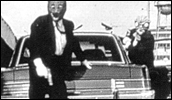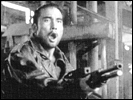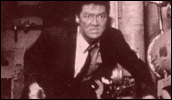Score
- Year
- 1995
- Original title
- Sukoa
- Japanese title
- スコーア
- Director
- Cast
- Running time
- 87 minutes
- Published
- 7 November 2001



by Tom Mes
Made at a time when Tarantino-fever had the world firmly in its grasp (remember those days?), Score is Japan's addition to the ranks of those ever-deteriorating, smugly violent, inbred action movies that were struggling for shelf space at video stores everywhere in the 1990s.
Unlike other domestic variations on the genre that at least tried to put their individual spin on things (such as Katsuhito Ishii's Shark Skin Man and Peach Hip Girl / Samehada Otoko to Momojiri Onna, 1998), Score is perfectly content with being yet another Reservoir Dogs clone, complete with black-suited robbers. These gents go for a carefully orchestrated heist, which inevitably goes wrong, leaving them with not one, but three Tim Roth-type wounded colleagues to take care of. Retreating back to a warehouse on the outskirts of town (there are actually two generic warehouse locations in the film, with the second inevitably used for the finale), they soon find themselves battling a group of heavies sent after them by the rightful owner of their loot.
Not satisfied with simply knocking of one Tarantino film, director Muroga actually mixes his Reservoir Dogs schtick with a generous amount of True Romance, as a pair of criminal lovers on the lam cross the robbers' paths and attempt to steal their loot. There's even a hint of Killing Zoe, with the robbers wearing animal masks as a disguise. Not even the Tarantino-admired John Woo is safe, with scenes from Hard Target recycled in both Score's opening scene and finale.
To make matters worse, the film was shot on the cheap in the Philippines, which very unsuccessfully stands in for the United States. With English-language credits, occasional dialogue, and road signs, it's not for lack of trying, but when the state troopers look suspiciously Filipino and drive Mitsubishi patrol cars, it doesn't take more than half a brain to figure out what's going on. Score was produced by the prolific Kazuyoshi Okuyama and one could hardly imagine a greater contrast with the lavish spectacle Rampo, which the producer delivered just one year earlier.
Overtly derivative, awkwardly structured, badly paced, with some glaring continuity errors - someone gets his arm virtually blown off at one point, but is fine again in the next scene - and a cast made up of mainly Eurasian pretty boys, Score would hardly qualify for anyone's distinction of great (or even moderately decent) cinema. Destined to be eternally, and deservedly, forgotten - despite the efforts of lead actor Hitoshi Ozawa (whose mullet has to be seen to be believed), who directed and starred in Score 2 - The Big Fight. Though things could hardly get any worse than part one, I don't think I'll bother.